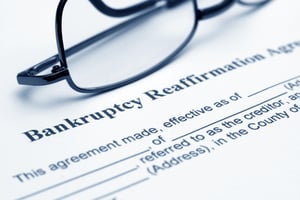 If you file a Chapter 7 bankruptcy in Minnesota, any secured lenders listed in your schedules are likely to send you a reaffirmation agreement to sign. More often than not, it is a bad idea to sign a reaffirmation agreement.
If you file a Chapter 7 bankruptcy in Minnesota, any secured lenders listed in your schedules are likely to send you a reaffirmation agreement to sign. More often than not, it is a bad idea to sign a reaffirmation agreement.
Reaffirmation agreements are the equivalent to re-signing the loan with the lender. While this might not sound like a big deal, there is a lot of avoidable risk associated with signing a reaffirmation agreement. I know what you’re thinking: “I want to keep my house and my car, so why wouldn’t I sign the reaffirmation agreement to keep my house and my car?” The reason is simple: because you can keep your house and your car without signing the reaffirmation agreement and avoid the risks associated with signing.
Home Mortgage Reaffirmation Agreements
Reaffirmations are rarely mandatory in order to keep the collateral secured to the loan. With a home mortgage, a reaffirmation agreement is never mandatory to keep your home. There are too many state laws and regulations that keep you protected from foreclosure. As long as you remain current and on time with your payments, you will get to keep your home.
The reaffirmation agreement has no influence on your mortgage lender’s intentions to foreclose or not. The only thing that can motivate foreclosure is if you miss payments on your home.
The reason we do not recommend signing mortgage reaffirmation agreements is because they only add risk back to your mortgage loan. Since the lender will let you keep your home without signing it, there is no benefit to signing it. There are only risks added back to your life by signing it. The risks include the lender’s ability to hurt your credit or sue you for the unpaid loan balance should you ever miss payments or foreclose.
Even those with the best intentions or ability to pay their mortgage shouldn’t take on this risk, because you do not know what the future holds for you. God forbid something tragic happened and you no longer could afford your mortgage, you want to be protected from the mortgage which is a protection provided form your bankruptcy discharge.
If you reaffirm the loan, you lose this protection and the lender gains back the ability to sue you and damage your credit. Without signing, they cannot damage your credit and cannot sue you for any unpaid balance in the unfortunate event of foreclosure.
Vehicle Loan Reaffirmation Agreements
Vehicle loan reaffirmation agreements follow the same rules I explained above regarding mortgages, but there are a couple details with vehicles that I want to add:
- The first rule is that there are a couple lenders that consider reaffirmation agreements mandatory in order to keep the vehicle. At this time, those are Ford Motor Credit, Spire Credit Union, and Hiway Federal Credit Union. If your vehicle is financed with one of these lenders, it is important to have a discussion with one of the experienced bankruptcy attorneys at Kain & Scott regarding whether you should reaffirm any loans with these lenders.
- The second rule is the importance of remaining current and on time with your car payments after a Chapter 7 bankruptcy. Other than the three lenders listed in the last paragraph, almost all other vehicle lenders follow the golden rule that if you remain current and on time with your payments, they will let you keep the car. That means you do not need to reaffirm the debt to keep the car, you just need to remain current and on time with your payments.
The one risk here, is that if you miss even one payment, it could be enough motivation for them to repossess the vehicle. If they repossess it for a missed payment, they will not be able to hurt your credit or sue you for the loan balance if you did not reaffirm.
If you reaffirmed, and miss a payment, they will repossess the car AND hurt your credit and sue you for the balance on the car loan. This is the risk we want to avoid. Do not sign a reaffirmation agreement without discussing the risks with your Kain & Scott bankruptcy attorney. - The third thing I want to mention with car loans, is that by NOT signing the reaffirmation agreement, you hold all of the power over the lender. As long as you remain current and on time with your payments they will let you keep the vehicle. If you pay off the lien, they will send you clear title. BUT, if you ever decide you do not want the car anymore before it is paid off, simply stop making payments. Eventually, they will come pick up the car, but they will not be able to hurt your credit or sue you for the balance. You can simply just let it go with no consequence other than losing possession of the vehicle.
CALL NOW FOR A FREE STRATEGY SESSION FROM A MN BANKRUPTCY LAWYER AT KAIN & SCOTT
Kain & Scott’s experienced bankruptcy attorneys know how to help Minnesotans navigate reaffirmation agreements. If you are interested in learning more about how bankruptcy can help with secured debts, reach out to Minnesota’s nicest bankruptcy law firm by going now to www.kainscott.com. You will be thankful you did.


